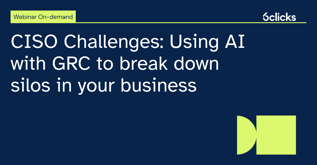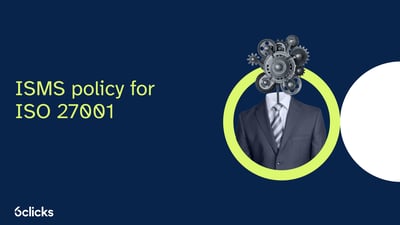GRC implementations are on the rise with the global GRC market projected to reach USD 1881.9 million by 2028. But even as more and more businesses attempt to implement GRC, are they equipped to do it the right way? 57% of senior-level executives say that they feel least prepared to address risk and compliance. Organisations are struggling to manage ‘risk’ which is a major part of their GRC programs.
Managed Security Service Providers (MSSPs) are no longer just responsible for basic cybersecurity management. Most MSSPs are venturing into risk management, regulation, and compliance, as part of a comprehensive offering for their clients. But before we move on to exploring how MSSPs can do all this and more, let’s look more closely at why organisations are struggling.
The challenges we all face with cybersecurity risk and compliance
There are four challenges for everyone - businesses and MSSPs - that create opportunity and the demand for cybersecurity managed services.
The acute shortage of skilled resources
Talent shortage has become a global concern and it’s difficult to find people with the right skills. According to a survey, 75% of companies are facing a talent shortage as of 2022 and it is estimated to rise even more in the coming years. Cybersecurity professionals are in severely short supply with 3.5 million open jobs globally in 2021.
The gross labour shortage leaves organisations short-staffed and unable to fulfil their demands for skilled resources for risk management.
The ongoing digital transformation boom
We are in the midst of a technology revolution and a lot of businesses are undergoing digital transformation. The downside of this is more exposure to threat. As companies adopt newer technology tools, they invariably increase their attack surfaces. In fact, a report suggests that 82% of IT leaders and security professionals believe that new technology adoption has exposed them to a data breach. Very few companies are able to effectively manage the risks that come with digital transformation, leaving them vulnerable to cyber-attacks.
Regulations and public trust expectations continue to rise
Cybersecurity regulations continue to intensify all over the globe. It is no secret that currently a majority of cybersecurity incidents go unreported. The main reason behind it is unclear regulations. There is also some disharmony in the regulations of different countries, making compliance obligations complex when there are cross-country business deals. To create a regulations landscape that brings more transparency and has more uniformity, we can expect changes to the regulatory requirements.
At the same time, awareness and concerns about data privacy are rising. Organisations need to put extra effort into cultivating trust when they deal with customer data. Also, data breaches or attempts thereof can be vastly damaging to the brand's reputation, keeping organisations on their toes as far as data protection is concerned.
The threat landscape continues to evolve and presents a significant risk
Even as organisations procure new technologies to fight cyber crime, the threat landscape continues to evolve with cyber criminals, too, using sophisticated methods to launch attacks. This is not something to take lightly either with attacks resulting in huge financial losses. By 2025, it is estimated that cyber crimes will translate into losses worth $10.5 trillion. When there is a cyber attack, the brand's reputation takes a fall. While it cannot always be assigned a monetary value, it is a significant risk.
Managing cyber risks, planning for response and remediation, and creating a robust cybersecurity strategy are critical tasks for an organisation. But it is easier said than done, with many organisations being grossly unprepared for dealing with security incidents.
Areas that MSSPs should address as part of their offerings
A truly effective service offering is where MSSPs streamline and simplify security and compliance management. Here are some of the areas which MSSPs need to address, in line with the changing needs of the clients.
Cloud security
With rising cloud adoption, MSPs need to provide solutions for cloud security to their customers. Cloud security is the set of tools, technologies, and procedures used to make data and applications in the cloud more secure. Cloud security is now more important than ever with remote work policies pushing information and application data to be stored in the cloud.
Information security policy management
Every organisation needs a strong information security management system (ISMS) that works in tandem with the GRC program. Ensuring the security of the client’s critical assets needs security policies to be defined. MSPs can help organisations build and enforce these policies effectively.
The 6clicks platform for MSPs allows advisors and MSPs to create security policies and other documents using the 6clicks content library and define obligations and controls so that compliance becomes easy for the clients. It also lets MSPs create user profiles, initiate risk assessments, and largely automate security practices.
Endpoint detection and response (EDR)
Attackers often target endpoints to gain access to critical information. Endpoint detection and response (EDR) combines monitoring the end points for threats and launching an automated response if a threat is detected.
The adoption of EDR solutions is already on the rise thanks to the increasing number of end points attached to networks and the evolving nature of attacks that target endpoints. MSSPs need to be prepared with EDR solutions that keep up with an organisation’s digital transformation.
Compliance
Compliance can be cryptic to understand. Compliance has long been equated with data privacy, requiring organisations to report a compliance issue only when there would be a data breach. This would often have meant that many cyber attacks would go unreported. But the sheer scale at which cyber attackers are now operating and the far-reaching impact of sophisticated attacks means that there is a burning need to change how compliance is perceived.
Governments of several countries have now realised this, and we can soon expect new compliance guidelines. Organisations need to be prepared for the new regulations that are inevitable. And who better to help them navigate this complex area than MSSPs? But in order to be able to do this, MSSPs need to provide solutions that are future-ready and can incorporate the new requirements as and when they are introduced.
Risk Management
With increasing cyber threats, cyber risk management needs to be taken more seriously than ever. Risk management does not only refer to treating or mitigating risk but also planning on response and recovery procedures if a threat manifests. It should also involve defining policies related to cybersecurity, building capabilities for a better cybersecurity posture, and having a robust security program in place.
The approach to risk management needs to be proactive. It also needs to be part of the business strategy since risks can impact business operations.
MSSPs have the ability to establish continuous risk management which many organisations lack. With access to talent and resources, industry experience, and the latest information on changing cybersecurity trends, MSSPs are much better poised to provide risk management to organisations.
How does 6clicks help MSSPs deliver more?
To be fair, many MSSPs do claim to provide a complete solution to an organisation’s cybersecurity and compliance challenges. But traditionally, this has been done by using spreadsheets, word documents, or outdated GRC software which all leaves a lot to be desired! If you are still using spreadsheets and word documents for GRC, read why it can be disastrous for your business - Why Spreadsheets are Dead.
There is a stark gap between what the companies need as part of complete cybersecurity and what they are able to manage themselves. MSSPs can bridge this gap. MSSPs can enhance customer experience, clients’ information security, and the quality of their own services by providing software solutions and tools that protect the customers’ information assets and help them manage GRC.
The 6clicks platform presents an easy way for MSSPs to deliver the most value to their clients and expand their own offerings and increase their revenue. Here's how.
- 6clicks lets you manage your clients' GRC through its Hub & Scope architecture.
- It helps you create free connected accounts for the clients. As the clients discover the value in the platform, you can resell the 6clicks license they need.
- 6clicks has a sprawling content library. However, you can also embed your own content in the form of risk and issue libraries, audit and assessment templates, control and obligation sets, compliance mappings, etc.
- Your advisors have a single-pane glass view of all clients' activity on the 6clicks platform, making it convenient to monitor and support operational activity.
- With the permission of your clients, you can run benchmarking and analysis across all your clients.
- 6clicks lets you develop custom reporting, dashboards, presentations, and stories and deploy them easily across all your clients.
Final thoughts
The transition from MSP (Managed Services Provider) to MSSP (Managed Security Services Provider) seems like an almost natural progression. With more and more organisations planning to outsource at least some part of their cybersecurity, this is a good growth strategy. In addition to cybersecurity, catering to the needs of organisations to implement GRC is an even better strategy and one that provides a competitive advantage. Read more about how 6clicks Hub & Spoke architecture revolutionises GRC implementation - GRC 20/20 Solution Perspective.
Written by Dr. Heather Buker
Heather has been a technical SME in the cybersecurity field her entire career from developing cybersecurity software to consulting, service delivery, architecting, and product management across most industry verticals. An engineer by trade, Heather specializes in translating business needs and facilitating solutions to complex cyber and GRC use cases with technology. Heather has a Bachelors in Computer Engineering, Masters in Engineering Management, and a Doctorate in Information Technology with a specialization in information assurance and cybersecurity.










